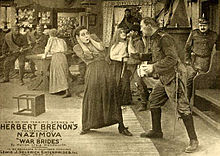War Brides (film)
| War Brides | |
|---|---|

Ad for film
|
|
| Directed by | Herbert Brenon |
| Produced by | Herbert Brenon |
| Written by | Herbert Brenon (scenario) |
| Based on |
War Brides (play) by Marion Craig Wentworth |
| Starring |
Nazimova Charles Bryant |
| Music by | Robert Hood Bowers |
| Cinematography | J. Roy Hunt |
| Edited by | James MacKaye |
| Distributed by | Selznick Pictures |
|
Release date
|
November 12, 1916 |
|
Running time
|
72 minutes |
| Country | United States |
| Language | Silent (English intertitles) |
War Brides is a lost 1916 American silent war drama film directed by Herbert Brenon and starring Alla Nazimova. The film marked Nazimova's debut in motion pictures.
The film's lost status makes it a sought-after title.
The film was based on the one-act play by the poet, playwright, and suffragist Marion Craig Wentworth (1872-1942). A newlywed soldier is sent to the front and killed. When his young widow learns of his death she considers committing suicide, but decides against it because she is pregnant. The King of her country (unnamed in the original; Germany in the later version) decrees that women must bear more children to fight in future wars. Soon afterwards, as the King is passing through her village, the pregnant widow leads a procession of women to protest the war. Soldiers try to hold her back, but she manages to come face to face with the King, and kills herself in front of him. The title card reads, "If you will not give us women the right to vote for or against war, I shall not bear a child for such a country!"
War Brides was one of the most successful plays of 1915. It opened in January at B.F. Keith's Palace Theatre in New York City, with Alla Nazimova in the lead role, and toured the country for several months. The play was so much in demand that a second production toured the South, with Gilda Varesi in the lead.
In 1916 it was made into a silent film, also starring Nazimova in her first onscreen role. The film did very well in the United States, bringing the studios a profit of $300,000, and was widely acclaimed by critics. Because of its pacifist message, it was banned in some cities and states. In 1917 it was withdrawn from circulation on the grounds that "The philosophy of this picture is so easily misunderstood by unthinking people". Later that year the producer, Lewis Selznick, had the film edited to give it an anti-German slant, and re-released it to American theaters. It was not shown in any other Allied countries.
...
Wikipedia
